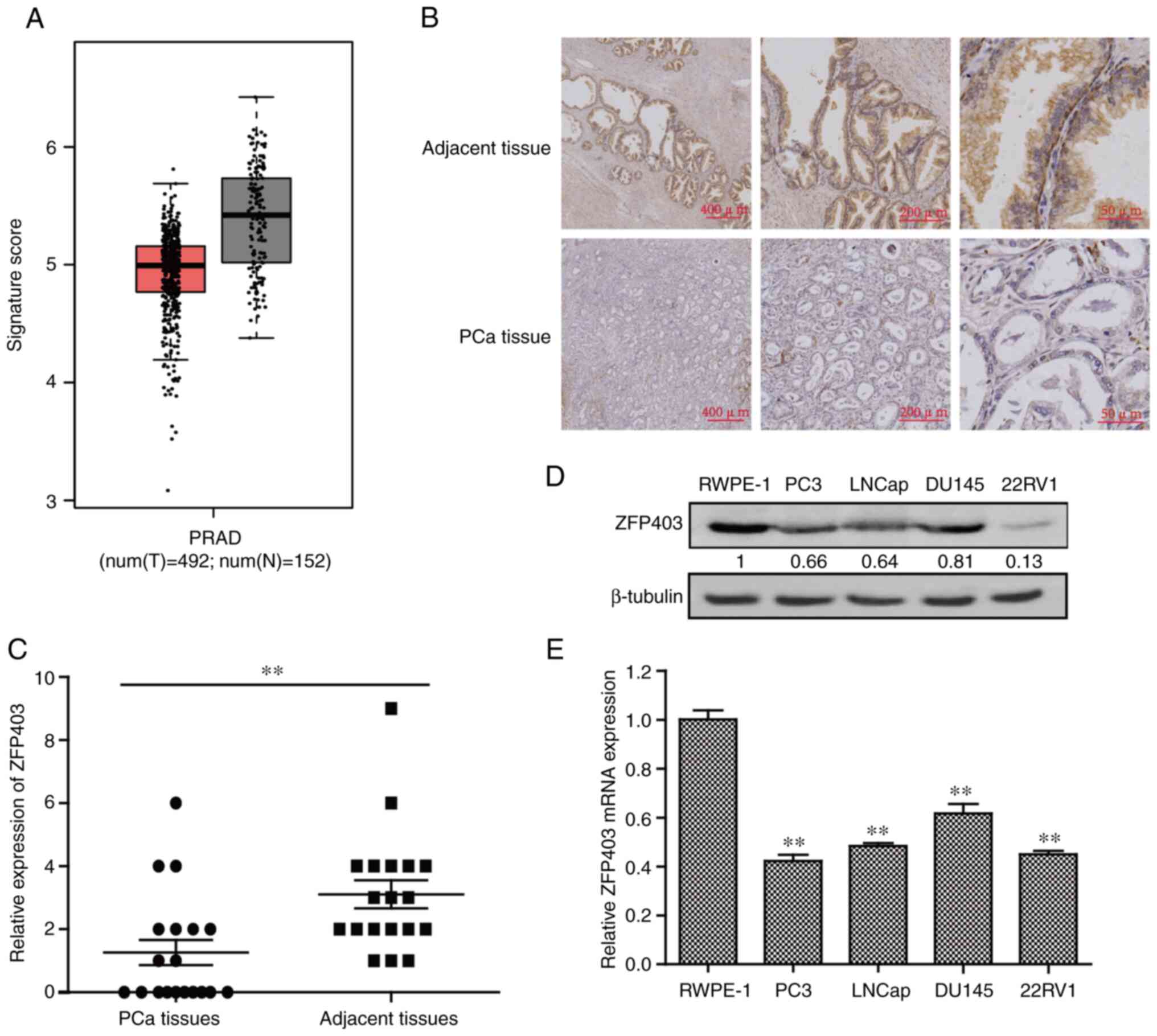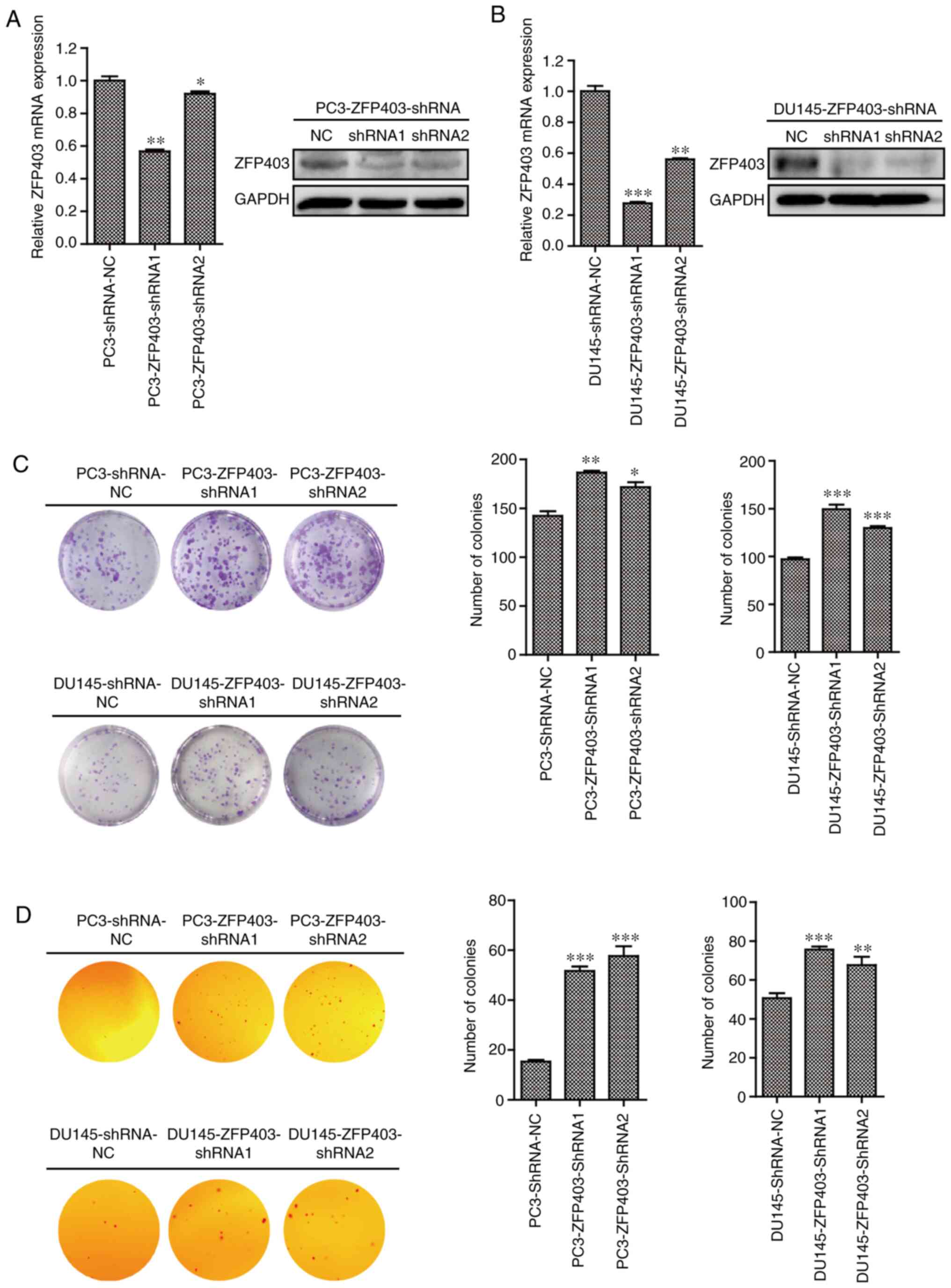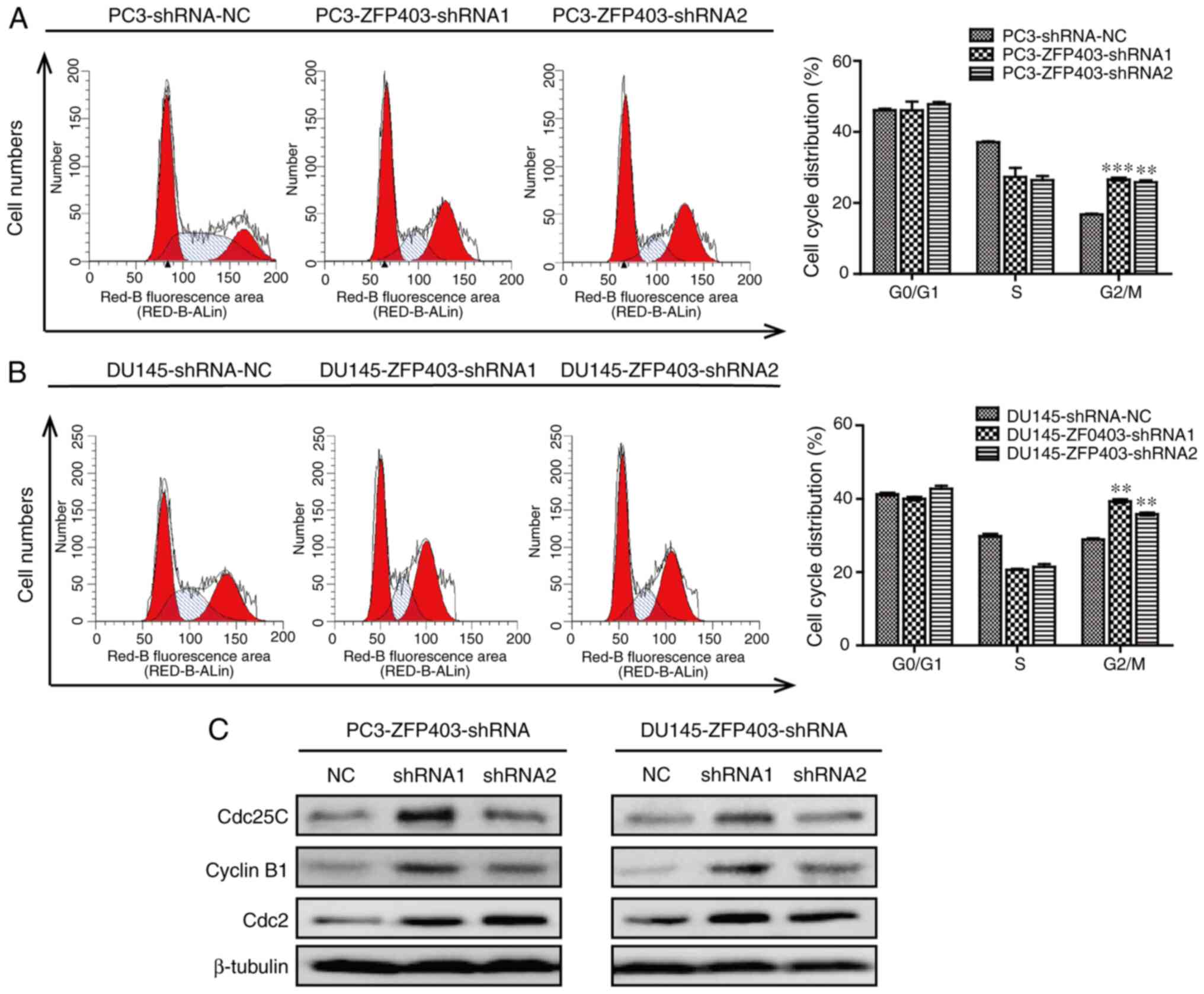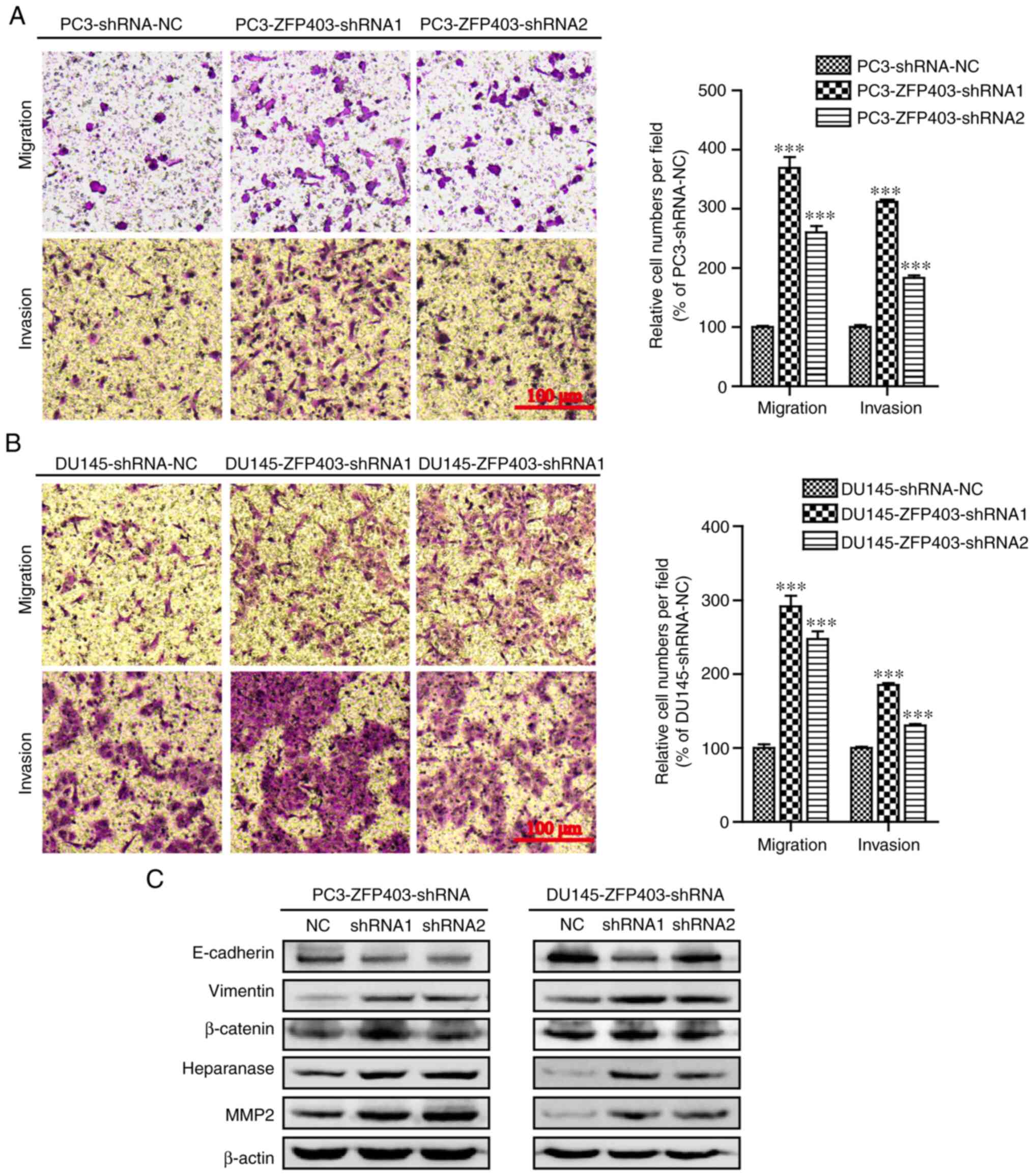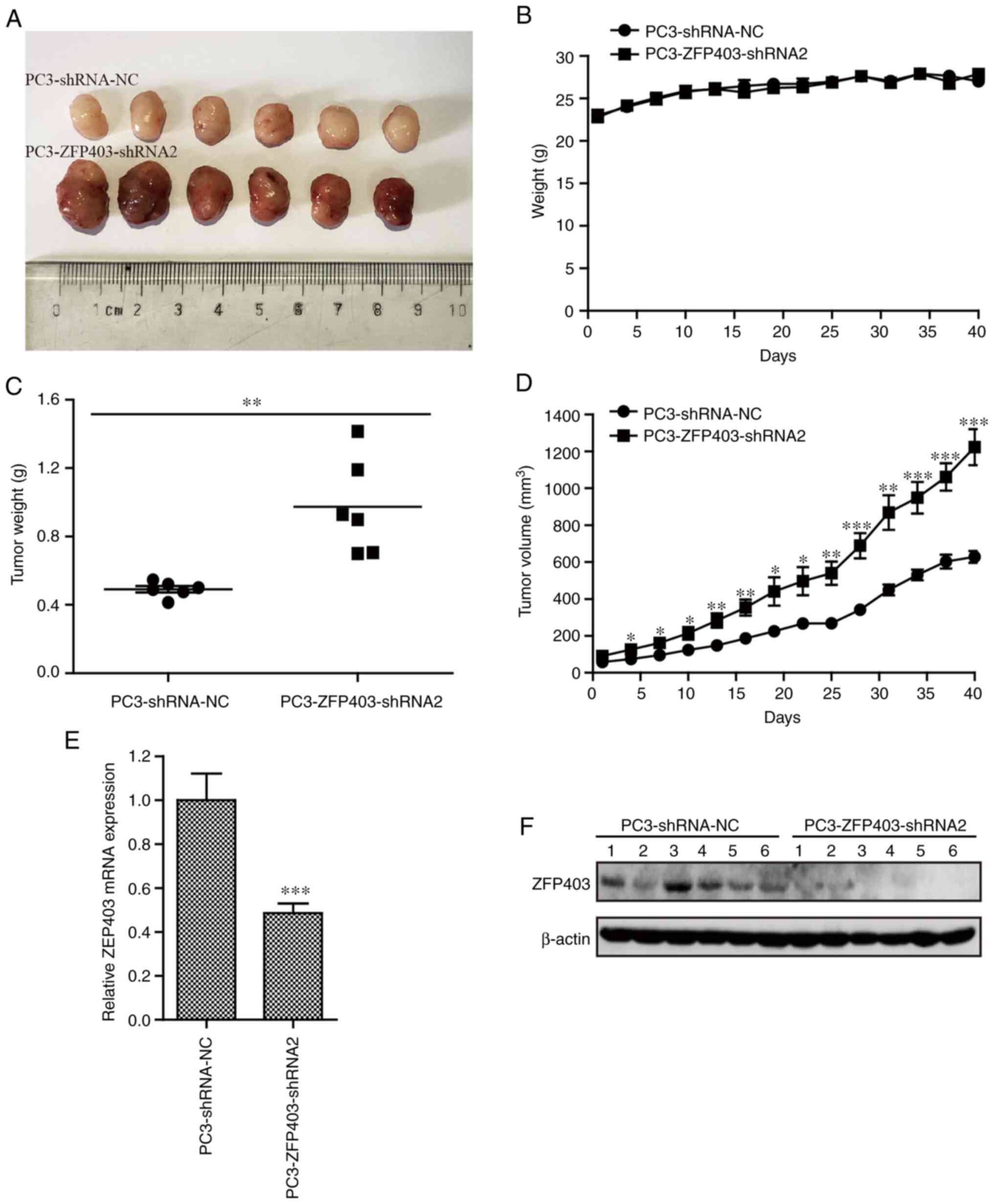|
1
|
Vlaeminck-Guillem V, Gillet G and Rimokh
R: SRC: Marker or actor in prostate cancer aggressiveness. Front
Oncol. 4:2222014. View Article : Google Scholar : PubMed/NCBI
|
|
2
|
Yap TA, Smith AD, Ferraldeschi R,
Al-Lazikani B, Workman P and de Bono JS: Drug discovery in advanced
prostate cancer: Translating biology into therapy. Nat Rev Drug
Discov. 15:699–718. 2016. View Article : Google Scholar : PubMed/NCBI
|
|
3
|
Nevedomskaya E, Baumgart SJ and Haendler
B: Recent advances in prostate cancer treatment and drug discovery.
Int J Mol Sci. 19:13592018. View Article : Google Scholar
|
|
4
|
Haymart MR, Miller DC and Hawley ST:
Active surveillance for low-risk cancers-a viable solution to
overtreatment? N Engl J Med. 377:203–206. 2017. View Article : Google Scholar : PubMed/NCBI
|
|
5
|
Crawford ED, Heidenreich A, Lawrentschuk
N, Tombal B, Pompeo ACL, Mendoza-Valdes A, Miller K, Debruyne FMJ
and Klotz L: Androgen-targeted therapy in men with prostate cancer:
Evolving practice and future considerations. Prostate Cancer
Prostatic Dis. 22:24–38. 2019. View Article : Google Scholar : PubMed/NCBI
|
|
6
|
Pan TF, Liang CZ, Chen XG and Fan S:
Mammalian target of rapamycin regulates androgen receptor and Akt
phosphorylation in prostate cancer 22RV1 cells. Zhonghua Nan Ke
Xue. 19:1068–1071. 2013.(In Chinese). PubMed/NCBI
|
|
7
|
Sumanasuriya S and De Bono J: Treatment of
advanced prostate cancer-a review of current therapies and future
promise. Cold Spring Harb Perspect Med. 8:a0306352018. View Article : Google Scholar : PubMed/NCBI
|
|
8
|
Wu CT, Chen WC and Chen MF: The response
of prostate cancer to androgen deprivation and irradiation due to
immune modulation. Cancers (Basel). 11:202018. View Article : Google Scholar
|
|
9
|
Lan ZJ, Hu YH, Zhang S, Li X, Zhou H, Ding
J, Klinge CM, Radde BN, Cooney AJ, Zhang J and Lei Z: GGNBP2 acts
as a tumor suppressor by inhibiting estrogen receptor α activity in
breast cancer cells. Breast Cancer Res Treat. 158:263–276. 2016.
View Article : Google Scholar : PubMed/NCBI
|
|
10
|
Guan R, Wen XY, Wu J, Duan R, Cao H, Lam
S, Hou D, Wang Y, Hu J and Chen Z: Knockdown of ZNF403 inhibits
cell proliferation and induces G2/M arrest by modulating cell-cycle
mediators. Mol Cell Biochem. 365:211–222. 2012. View Article : Google Scholar : PubMed/NCBI
|
|
11
|
Zhang J, Wang Y, Zhou Y, Cao Z, Huang P
and Lu B: Yeast two-hybrid screens imply that GGNBP1, GGNBP2 and
OAZ3 are potential interaction partners of testicular germ
cell-specific protein GGN1. FEBS Lett. 579:559–566. 2005.
View Article : Google Scholar : PubMed/NCBI
|
|
12
|
Li Y and Chen Z: Molecular cloning and
characterization of LCRG1 a novel gene localized to the tumor
suppressor locus D17S800-D17S930. Cancer Lett. 209:75–85. 2004.
View Article : Google Scholar : PubMed/NCBI
|
|
13
|
Plummer SJ, Paris MJ, Myles J, Tubbs R,
Crowe J and Casey G: Four regions of allelic imbalance on
17q12-qter associated with high-grade breast tumors. Genes
Chromosomes Cancer. 20:354–362. 1997. View Article : Google Scholar : PubMed/NCBI
|
|
14
|
Zhu Z, Lou C, Zheng Z, Zhu R, Tian S, Xie
C and Zhao H: ZFP403, a novel tumor suppressor, inhibits the
proliferation and metastasis in ovarian cancer. Gynecol Oncol.
147:418–425. 2017. View Article : Google Scholar : PubMed/NCBI
|
|
15
|
Zhan A, Lei B, Wu H, Wen YT, Zheng L, Wang
S, Wan X and Wei Z: GGNBP2 suppresses the proliferation, invasion,
and migration of human glioma cells. Oncol Res. 25:831–842. 2017.
View Article : Google Scholar : PubMed/NCBI
|
|
16
|
Guo K, He Y, Liu L, Liang Z, Li X, Cai L,
Lan ZJ, Zhou J, Wang H and Lei Z: Ablation of Ggnbp2 impairs
meiotic DNA double-strand break repair during spermatogenesis in
mice. J Cell Mol Med. 22:4863–4874. 2018. View Article : Google Scholar : PubMed/NCBI
|
|
17
|
Livak KJ and Schmittgen TD: Analysis of
relative gene expression data using real-time quantitative PCR and
the 2(-Delta Delta C(T)) method. Methods. 25:402–408. 2001.
View Article : Google Scholar : PubMed/NCBI
|
|
18
|
Yang B, Zhao Y, Lou C and Zhao H:
Eupalinolide O, a novel sesquiterpene lactone from eupatorium
lindleyanum DC., induces cell cycle arrest and apoptosis in
human MDA-MB-468 breast cancer cells. Oncol Rep. 36:2807–2813.
2016. View Article : Google Scholar : PubMed/NCBI
|
|
19
|
Tian SS, Chen Y, Yang B, Lou C, Zhu R,
Zhao Y and Zhao H: F1012-2 inhibits the growth of triple negative
breast cancer through induction of cell cycle arrest, apoptosis,
and autophagy. Phytother Res. 32:908–922. 2018. View Article : Google Scholar : PubMed/NCBI
|
|
20
|
Li LZ, Zhang CZ, Liu LL, Yi C, Lu SX, Zhou
X, Zhang ZJ, Peng YH, Yang YZ and Yun JP: miR-720 inhibits tumor
invasion and migration in breast cancer by targeting TWIST1.
Carcinogenesis. 35:469–478. 2014. View Article : Google Scholar : PubMed/NCBI
|
|
21
|
Yang B, Zhu R, Tian S, Wang Y, Lou S and
Zhao H: Jatamanvaltrate P induces cell cycle arrest, apoptosis and
autophagy in human breast cancer cells in vitro and in vivo. Biomed
Pharmacother. 89:1027–1036. 2017. View Article : Google Scholar : PubMed/NCBI
|
|
22
|
Baade PD, Youlden DR and Krnjacki LJ:
International epidemiology of prostate cancer: Geographical
distribution and secular trends. Mol Nutr Food Res. 53:171–184.
2009. View Article : Google Scholar : PubMed/NCBI
|
|
23
|
Torre LA, Bray F, Siegel RL, Ferlay J,
Lortet-Tieulent J and Jemal A: Global cancer statistics, 2012. CA
Cancer J Clin. 65:87–108. 2015. View Article : Google Scholar : PubMed/NCBI
|
|
24
|
Chang AJ, Autio KA, Roach M III and Scher
HI: High-risk prostate cancer-classification and therapy. Nat Rev
Clin Oncol. 11:308–323. 2014. View Article : Google Scholar : PubMed/NCBI
|
|
25
|
Miyamoto H, Messing EM and Chang C:
Androgen deprivation therapy for prostate cancer: Current status
and future prospects. Prostate. 61:332–353. 2004. View Article : Google Scholar : PubMed/NCBI
|
|
26
|
Uemura H, Ishiguro H, Nakaigawa N,
Nagashima Y, Miyoshi Y, Fujinami K, Sakaguchi A and Kubota Y:
Angiotensin II receptor blocker shows antiproliferative activity in
prostate cancer cells: A possibility of tyrosine kinase inhibitor
of growth factor. Mol Cancer Ther. 2:1139–1147. 2003.PubMed/NCBI
|
|
27
|
Li J, Luo J, Gu D, Jie F, Pei N, Li A,
Chen X, Zhang Y, Du H, Chen B, et al: Adenovirus-mediated
angiotensin II type 2 receptor overexpression inhibits tumor growth
of prostate cancer in vivo. J Cancer. 7:184–191. 2016. View Article : Google Scholar : PubMed/NCBI
|
|
28
|
Walsh PC, DeWeese TL and Eisenberger MA:
Clinical practice. Localized prostate cancer. N Engl J Med.
357:2696–2705. 2007. View Article : Google Scholar : PubMed/NCBI
|
|
29
|
Bommareddy A, Rule B, VanWert AL, Santha S
and Dwivedi C: α-Santalol, a derivative of sandalwood oil, induces
apoptosis in human prostate cancer cells by causing caspase-3
activation. Phytomedicine. 19:804–811. 2012. View Article : Google Scholar : PubMed/NCBI
|
|
30
|
Wirth T and Ylä-Herttuala S: Gene therapy
used in cancer treatment. Biomedicines. 2:149–162. 2014. View Article : Google Scholar : PubMed/NCBI
|
|
31
|
Workman P: New drug targets for genomic
cancer therapy: Successes, limitations, opportunities and future
challenges. Curr Cancer Drug Targets. 1:33–47. 2001. View Article : Google Scholar : PubMed/NCBI
|
|
32
|
Saraon P, Musrap N, Cretu D, Karagiannis
GS, Batruch I, Smith C, Drabovich AP, Trudel D, van der Kwast T,
Morrissey C, et al: Proteomic profiling of androgen-independent
prostate cancer cell lines reveals a role for protein S during the
development of high grade and castration-resistant prostate cancer.
J Biol Chem. 287:34019–34031. 2012. View Article : Google Scholar : PubMed/NCBI
|
|
33
|
Ozen M and Ittmann M: Increased expression
and activity of CDC25C phosphatase and an alternatively spliced
variant in prostate cancer. Clin Cancer Res. 11:4701–4706. 2005.
View Article : Google Scholar : PubMed/NCBI
|
|
34
|
Mashal RD, Lester S, Corless C, Richie JP,
Chandra R, Propert KJ and Dutta A: Expression of cell
cycle-regulated proteins in prostate cancer. Cancer Res.
56:4159–4163. 1996.PubMed/NCBI
|
|
35
|
Kallakury BV, Sheehan CE, Ambros RA,
Fisher HA, Kaufman RP Jr, Muraca PJ and Ross JS: Correlation of
p34cdc2 cyclin-dependent kinase overexpression, CD44s
downregulation, and HER-2/neu oncogene amplification with
recurrence in prostatic adenocarcinomas. J Clin Oncol.
16:1302–1309. 1998. View Article : Google Scholar : PubMed/NCBI
|
|
36
|
Maddison LA, Huss WJ, Barrios RM and
Greenberg NM: Differential expression of cell cycle regulatory
molecules and evidence for a ‘cyclin switch’ during progression of
prostate cancer. Prostate. 58:335–344. 2004. View Article : Google Scholar : PubMed/NCBI
|
|
37
|
Lander ES, Linton LM, Birren B, Nusbaum C,
Zody MC, Baldwin J, Devon K, Dewar K, Doyle M, FitzHugh W, et al:
Initial sequencing and analysis of the human genome. Nature.
409:860–921. 2001. View Article : Google Scholar : PubMed/NCBI
|
|
38
|
Tupler R, Perini G and Green MR:
Expressing the human genome. Nature. 409:832–833. 2001. View Article : Google Scholar : PubMed/NCBI
|
|
39
|
Jen JY and Wang YC: Zinc finger proteins
in cancer progression. J Biomed Sci. 23:532016. View Article : Google Scholar : PubMed/NCBI
|
|
40
|
Cassandri M, Smirnov A, Novelli F, Pitolli
C, Agostini M, Malewicz M, Melino G and Raschellà G: Zinc-finger
proteins in health and disease. Cell Death Discov. 3:170172017.
View Article : Google Scholar : PubMed/NCBI
|
|
41
|
Clarke NW, Hart CA and Brown MD: Molecular
mechanisms of metastasis in prostate cancer. Asian J Androl.
11:57–67. 2009. View Article : Google Scholar : PubMed/NCBI
|
|
42
|
Chen HN, Yuan K, Xie N, Wang K, Huang Z,
Chen Y, Dou Q, Wu M, Nice EC, Zhou ZG and Huang C: PDLIM1
stabilizes the E-Cadherin/β-catenin complex to prevent
epithelial-mesenchymal transition and metastatic potential of
colorectal cancer cells. Cancer Res. 76:1122–1134. 2016. View Article : Google Scholar : PubMed/NCBI
|
|
43
|
Yang Z, Wang Y and Ma L: Effects of
gametogenetin-binding protein 2 on proliferation, invasion and
migration of prostate cancer PC-3 cells. Andrologia. 52:e134882020.
View Article : Google Scholar : PubMed/NCBI
|















